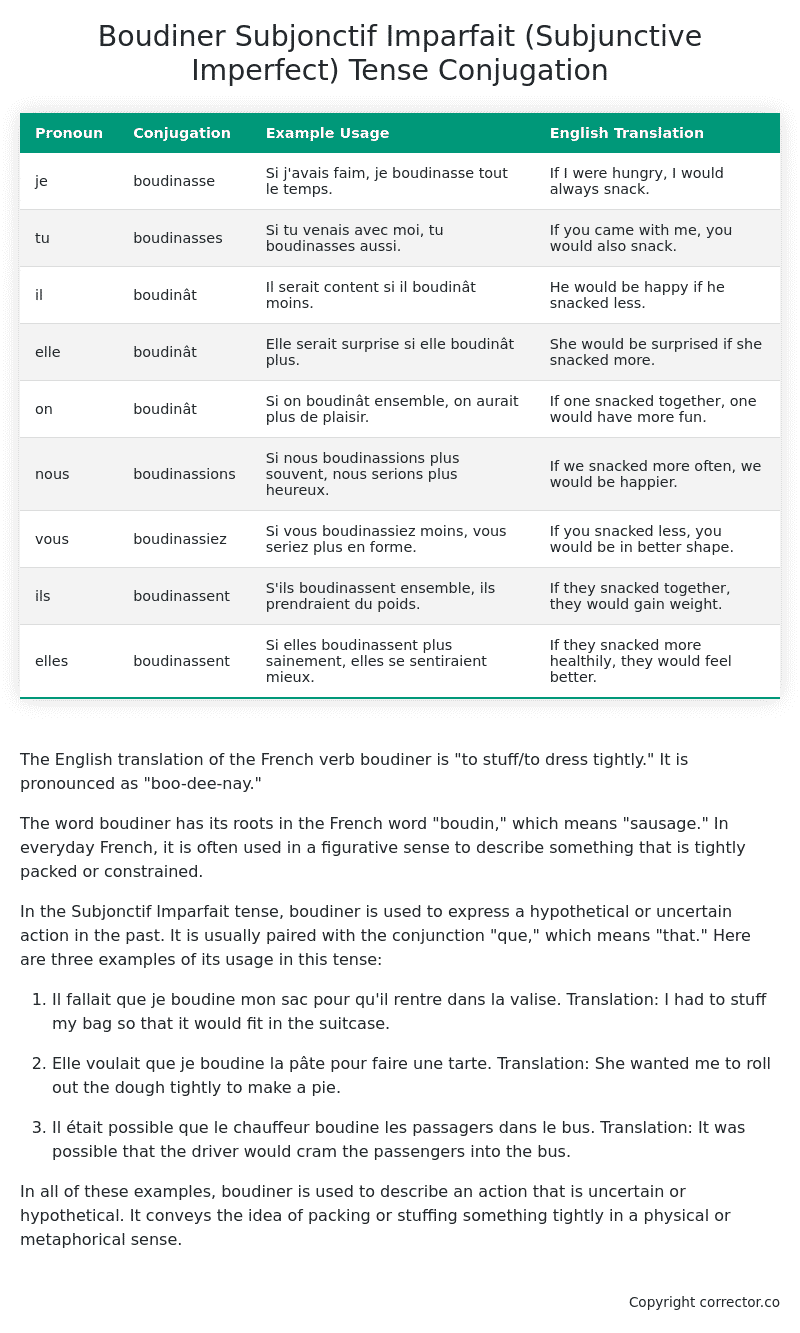Subjonctif Imparfait (Subjunctive Imperfect) Tense Conjugation of the French Verb boudiner
Introduction to the verb boudiner
The English translation of the French verb boudiner is “to stuff/to dress tightly.” It is pronounced as “boo-dee-nay.”
The word boudiner has its roots in the French word “boudin,” which means “sausage.” In everyday French, it is often used in a figurative sense to describe something that is tightly packed or constrained.
In the Subjonctif Imparfait tense, boudiner is used to express a hypothetical or uncertain action in the past. It is usually paired with the conjunction “que,” which means “that.” Here are three examples of its usage in this tense:
-
Il fallait que je boudine mon sac pour qu’il rentre dans la valise.
Translation: I had to stuff my bag so that it would fit in the suitcase. -
Elle voulait que je boudine la pâte pour faire une tarte.
Translation: She wanted me to roll out the dough tightly to make a pie. -
Il était possible que le chauffeur boudine les passagers dans le bus.
Translation: It was possible that the driver would cram the passengers into the bus.
In all of these examples, boudiner is used to describe an action that is uncertain or hypothetical. It conveys the idea of packing or stuffing something tightly in a physical or metaphorical sense.
Table of the Subjonctif Imparfait (Subjunctive Imperfect) Tense Conjugation of boudiner
| Pronoun | Conjugation | Example Usage | English Translation |
|---|---|---|---|
| je | boudinasse | Si j’avais faim, je boudinasse tout le temps. | If I were hungry, I would always snack. |
| tu | boudinasses | Si tu venais avec moi, tu boudinasses aussi. | If you came with me, you would also snack. |
| il | boudinât | Il serait content si il boudinât moins. | He would be happy if he snacked less. |
| elle | boudinât | Elle serait surprise si elle boudinât plus. | She would be surprised if she snacked more. |
| on | boudinât | Si on boudinât ensemble, on aurait plus de plaisir. | If one snacked together, one would have more fun. |
| nous | boudinassions | Si nous boudinassions plus souvent, nous serions plus heureux. | If we snacked more often, we would be happier. |
| vous | boudinassiez | Si vous boudinassiez moins, vous seriez plus en forme. | If you snacked less, you would be in better shape. |
| ils | boudinassent | S’ils boudinassent ensemble, ils prendraient du poids. | If they snacked together, they would gain weight. |
| elles | boudinassent | Si elles boudinassent plus sainement, elles se sentiraient mieux. | If they snacked more healthily, they would feel better. |
Other Conjugations for Boudiner.
Le Present (Present Tense) Conjugation of the French Verb boudiner
Imparfait (Imperfect) Tense Conjugation of the French Verb boudiner
Passé Simple (Simple Past) Tense Conjugation of the French Verb boudiner
Passé Composé (Present Perfect) Tense Conjugation of the French Verb boudiner
Futur Simple (Simple Future) Tense Conjugation of the French Verb boudiner
Futur Proche (Near Future) Tense Conjugation of the French Verb boudiner
Plus-que-parfait (Pluperfect) Tense Conjugation of the French Verb boudiner
Passé Antérieur (Past Anterior) Tense Conjugation of the French Verb boudiner
Futur Antérieur (Future Anterior) Tense Conjugation of the French Verb boudiner
Subjonctif Présent (Subjunctive Present) Tense Conjugation of the French Verb boudiner
Subjonctif Passé (Subjunctive Past) Tense Conjugation of the French Verb boudiner
Subjonctif Imparfait (Subjunctive Imperfect) Tense Conjugation of the French Verb boudiner (this article)
Subjonctif Plus-que-parfait (Subjunctive Pluperfect) Tense Conjugation of the French Verb boudiner
Conditionnel Présent (Conditional Present) Tense Conjugation of the French Verb boudiner
Conditionnel Passé (Conditional Past) Tense Conjugation of the French Verb boudiner
L’impératif Présent (Imperative Present) Tense Conjugation of the French Verb boudiner
L’infinitif Présent (Infinitive Present) Tense Conjugation of the French Verb boudiner
Struggling with French verbs or the language in general? Why not use our free French Grammar Checker – no registration required!
Get a FREE Download Study Sheet of this Conjugation 🔥
Simply right click the image below, click “save image” and get your free reference for the boudiner Subjonctif Imparfait tense conjugation!

Boudiner – About the French Subjonctif Imparfait (Subjunctive Imperfect) Tense
Formation
Common Everyday Usage Patterns
Interactions with Other Tenses
Subjonctif Présent
Indicatif Passé Composé
Conditional
Conditional Perfect
Summary
I hope you enjoyed this article on the verb boudiner. Still in a learning mood? Check out another TOTALLY random French verb conjugation!


